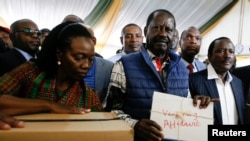Odinga, 77, filed a legal challenge to the Supreme Court last week following the Independent Electoral and Boundaries Commission (IEBC)'s confirmation of a narrow win for 55-year-old Deputy President William Ruto. The IEBC said Ruto garnered 50.49% of votes cast while Odinga polled 48.85%
Declan Galvin of Nairobi-based risk advisory company WS Insight told VOA that Odinga has contributed immensely to strengthening the credibility of key institutions like the judiciary and IEBC with his regular disputes of elections. However, he added, the veteran opposition leader is ''up against the precedents and progress that he's actually contributed to.''
''While in the near term, it's true that a lot of criticisms of these institutions diminish confidence, in the long run this is a good thing. There are a lot of important questions that the Supreme Court needs to weigh in on like whether IEBC chair is the genuine national returning officer for the presidential results. Who has that responsibility, and how shared or dispersed is that responsibility among the other commissioners? These questions need clarity once and for all,'' he said.
Galvin added, ''I look at this in a positive way because it allows that public to in a transparent way understand how constitutional election law will be applied to this case.''
In 2017, Kenya's top court delivered a historic ruling by nullifying the re-election of President Uhuru Kenyatta and ordered a fresh re-run of polls — a first in Africa. Odinga had filed the election petition alleging irregularities, but boycotted the new vote that gave Kenyatta a second term.
If the ruling is in his favor, Galvin said he believes Odinga will participate in a run-off since he "has said he will accept the verdict of the Supreme Court."
Hubert Kinkoh, an East Africa conflict, security and governance analyst told VOA that if Odinga loses the case, he will no longer be the face of Kenya's opposition and will likely not play any significant role in the region's political landscape.
''For [Raila Odinga], this is a last attempt to ascend the presidency, and he implicitly feels like the alleged collusion between [William Ruto] and the IEBC is a ploy to ensure that he doesn't become the next president — one which he believes will not succeed,'' Kinkoh said.
Such electoral disputes, he said, put the integrity of Kenyan elections into question, but acknowledged that ''those scenarios have led to progress in terms of how Kenyan elections continue to shape its institutions.''
"Over the years, the disagreements that have come up following elections have often led to changes within the IEBC - changes in terms of legislation and personnel," Kinkoh said. "This is important not just for Kenya, but the rest of the continent.''
The Supreme Court has until September 5 to announce its ruling.




